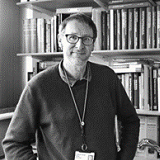BMT Scientific Advisory Board

Professor Roger A. Barker
Roger Barker is the Professor of Clinical Neuroscience at the University of Cambridge and Consultant Neurologist at the Addenbrooke’s Hospital Cambridge. He is a guest professor at the University of Lund, Sweden and the Edith Cowan University, Australia. He trained in Oxford and St Thomas’ Hospital in London and after completing his general medical training undertook a PhD at Cambridge on neural grafting before completing his neurology training including working with the late David Marsden.
For the last 25 years Roger Barker has run research that seeks to better define the clinical heterogeneity of two common neurodegenerative disorders of the CNS- namely Parkinson’s (PD) and Huntington’s disease (HD). This he has done by collecting large cohorts of incident cases and following them over time using an array of investigational and assessment tools. As part of this work he became interested in the observation that patients with early stage disease often had disturbed sleep and has for the last 10 years being investigated circadian abnormalities in these cohorts of patients. This has allowed his team to better understand the timing of onset of such problems and more recently their basis and consequences for disease progression and expression.
In addition he has been heavily involved in gene and cell based trials for patients with these conditions and currently co-ordinates an EU funded transplant programme using human fetal tissue for patients with PD, following on from an earlier MRC funded trial using similar tissue in HD. He is part of a new EU project (NeuroStemCellRepair) and a global initiative (GFORCE-PD) that is seeking to take stem cells to trial in these disorders.
He is currently is Co-Editor in Chief of the Journal of Neurology and sits on the editorial board of many other journals. He has just stepped down as the chairman of the ERC Advanced grants in Neuroscience committee, and is on the research advisory board of the Cure PD Trust and Parkinson’s UK. In 2015 he was elected a Fellow of the Academy of Medical Sciences.